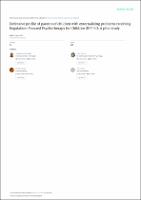Please use this identifier to cite or link to this item:
https://hdl.handle.net/20.500.12202/9915| Title: | Defensive profile of parents of children with externalizing problems receiving Regulation-Focused Psychotherapy for Children (RFP-C): A pilot study |
| Authors: | Prout, Tracy Di Giuseppe, Mariagrazia Fabiani, Matilde Kui, Thomas 0000-0002-3650-5890 |
| Keywords: | emotion regulation defense mechanisms oppositional defiant disorder externalizing behavior child psychotherapy clinical psychology. Psychology BF1-990 |
| Issue Date: | 2020 |
| Publisher: | University of Messina, 2020. |
| Citation: | Di Giuseppe, M., Prout, T. A., Fabiani, M., & Kui, T. (2020). Defensive profile of parents of children with externalizing problems receiving Regulation Focused Psychotherapy for Children: A pilot study. Mediterranean Journal of Clinical Psychology, 8(2). |
| Series/Report no.: | Journal of Clinical Psychology;8(2) |
| Abstract: | Background:Implicit emotion regulation, operationalized as psychological defense mechanisms, plays an important role in parenting, especially for parents of children with externalizing behavior problems. Research has highlighted the efficacy of the Regulation Focused Psychotherapy for Children (RFP-C) in reducing psychological distress in children with oppositional defiant disorder (Prout et al., 2019; Prout, 2020). The current, mixed-methods study analyzed the characteristic defensive functioning of parents whose children were treated with RFP-C. Methods:We analyzed 14 video-recorded parent sessions randomly selected from the RFP-C randomized controlled trial examining the efficacy of a novel manualized psychotherapy for children with externalizing behaviors. Defensive functioning was quantitatively and qualitatively analyzed using the Q-sort version of the Defense Mechanisms Rating Scales (DMRS-Q; Di Giuseppe et al., 2014) for parents in the clinical sample and community controls. Results:Adaptive, obsessional, and neurotic defenses were most prevalent, with 10 to 30 defense mechanisms accounting for more than 5% of the overall defensive functioning score. Significantly higher use of affiliation, humor, suppression, and devaluation of other’s image were found among parents of children with oppositional defiant disorder as compared to community controls. Defensive Profile Narratives added a qualitative understanding of the strength and limitations of the caregivers’ emotion regulation. Discussion:Studying parents’ defense mechanisms may provide a better understanding of the parental experience of childhood distress and how parental defensive style may impact children’s externalizing behaviors. Addressing defensive functioning in a clinical setting could enhance psychological adjustment among children with oppositional defiant disorder and improve therapeutic outcomes. |
| Description: | Scholarly article / Open access |
| URI: | https://www.researchgate.net/publication/343639641_Defensive_profile_of_parents_of_children_with_externalizing_problems_receiving_Regulation-Focused_Psychotherapy_for_Children_RFP-C_A_pilot_study/link/5f359c9fa6fdcccc43c65618/download?_tp=eyJjb250ZXh0Ijp7ImZpcnN0UGFnZSI6InB1YmxpY2F0aW9uIiwicGFnZSI6InB1YmxpY2F0aW9uIn19 https://hdl.handle.net/20.500.12202/9915 |
| ISSN: | 2282-1619 |
| Appears in Collections: | Ferkauf Graduate School of Psychology: Faculty Publications |
Files in This Item:
| File | Description | Size | Format | |
|---|---|---|---|---|
| Prout 2020 OA Defensive profile of parents of children.pdf | 791.35 kB | Adobe PDF |  View/Open |
This item is licensed under a Creative Commons License

